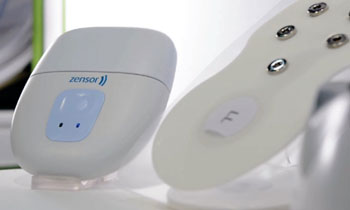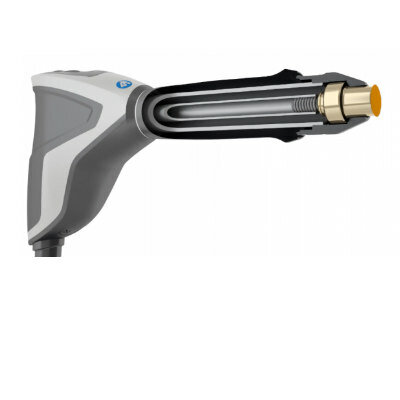Wearable Device Monitors Vital Signs Continuously 
|
By HospiMedica International staff writers Posted on 27 Oct 2015 |

Image: The Zensor system (Photo courtesy of Intelesens).
A novel wearable vital signs monitor facilitates real time monitoring of electrocardiogram (ECG) signals, heart rate, respiration rate, and motion.
The Zensor is a miniaturized clip on device that is attached to a disposable adhesive electrode array that monitors a range of vital signs data, transmitting information wirelessly to a remote server for a period of up to 168 hours (7 days) in a home or remote setting. During the week long monitoring session, the device is also capable of recording full interpretive ECG data for download and analysis by a trained healthcare professional. The system provides full configurability of the duration and frequency of monitored data, including the length of each recorded event.
Features of the system include 3-lead ECG full disclosure and cardiac event monitoring; symptomatic and asymptomatic arrhythmia event detection using on-device algorithms; monitoring of heart rate, respiration, and motion; and a rechargeable battery, replaceable in situ, when needed for extended periods of continuous use. The highly miniaturized, reusable, compact and lightweight body-worn wireless sensor is non-irritant, and is easy-to-apply using the long-life patch electrodes.
Transmission of detected arrhythmias and rate limit breaches is over standard Wi-Fi or mobile hotspot to the zensoronline website, with normal ranges and pre and post event data reporting configurable by the clinician. Data can also be downloaded via USB to zensor+ software. The Zensor vital signs monitor is a product of Intelesens (Belfast, United Kingdom), and has been approved by the US Food and Drug Administration (FDA).
“FDA clearance gives Intelesens and customers confidence in Zensor’s quality, robustness, and clinical efficacy,” said Stephen Henderson, commercial manager of Intelesens. “It brings a step closer the promise of preventative, predictive and protective technology, enabling clinicians proactively to help safeguard the quality of the life patients have yet to live.”
Related Links:
Intelesens
Zensoronline
The Zensor is a miniaturized clip on device that is attached to a disposable adhesive electrode array that monitors a range of vital signs data, transmitting information wirelessly to a remote server for a period of up to 168 hours (7 days) in a home or remote setting. During the week long monitoring session, the device is also capable of recording full interpretive ECG data for download and analysis by a trained healthcare professional. The system provides full configurability of the duration and frequency of monitored data, including the length of each recorded event.
Features of the system include 3-lead ECG full disclosure and cardiac event monitoring; symptomatic and asymptomatic arrhythmia event detection using on-device algorithms; monitoring of heart rate, respiration, and motion; and a rechargeable battery, replaceable in situ, when needed for extended periods of continuous use. The highly miniaturized, reusable, compact and lightweight body-worn wireless sensor is non-irritant, and is easy-to-apply using the long-life patch electrodes.
Transmission of detected arrhythmias and rate limit breaches is over standard Wi-Fi or mobile hotspot to the zensoronline website, with normal ranges and pre and post event data reporting configurable by the clinician. Data can also be downloaded via USB to zensor+ software. The Zensor vital signs monitor is a product of Intelesens (Belfast, United Kingdom), and has been approved by the US Food and Drug Administration (FDA).
“FDA clearance gives Intelesens and customers confidence in Zensor’s quality, robustness, and clinical efficacy,” said Stephen Henderson, commercial manager of Intelesens. “It brings a step closer the promise of preventative, predictive and protective technology, enabling clinicians proactively to help safeguard the quality of the life patients have yet to live.”
Related Links:
Intelesens
Zensoronline
Latest Critical Care News
- On-Skin Wearable Bioelectronic Device Paves Way for Intelligent Implants
- First-Of-Its-Kind Dissolvable Stent to Improve Outcomes for Patients with Severe PAD
- AI Brain-Age Estimation Technology Uses EEG Scans to Screen for Degenerative Diseases
- Wheeze-Counting Wearable Device Monitors Patient's Breathing In Real Time
- Wearable Multiplex Biosensors Could Revolutionize COPD Management
- New Low-Energy Defibrillation Method Controls Cardiac Arrhythmias
- New Machine Learning Models Help Predict Heart Disease Risk in Women
- Deep-Learning Model Predicts Arrhythmia 30 Minutes before Onset
- Breakthrough Technology Combines Detection and Treatment of Nerve-Related Disorders in Single Procedure
- Plasma Irradiation Promotes Faster Bone Healing
- New Device Treats Acute Kidney Injury from Sepsis
- Study Confirms Safety of DCB-Only Strategy for Treating De Novo Left Main Coronary Artery Disease
- Revascularization Improves Quality of Life for Patients with Chronic Limb Threatening Ischemia
- AI-Driven Prediction Models Accurately Predict Critical Care Patient Deterioration
- Preventive PCI for High-Risk Coronary Plaques Reduces Cardiac Events
- AI Diagnostic Tool Guides Rapid Diagnosis and Prediction of Sepsis
Channels
Artificial Intelligence
view channel
AI-Powered Algorithm to Revolutionize Detection of Atrial Fibrillation
Atrial fibrillation (AFib), a condition characterized by an irregular and often rapid heart rate, is linked to increased risks of stroke and heart failure. This is because the irregular heartbeat in AFib... Read more
AI Diagnostic Tool Accurately Detects Valvular Disorders Often Missed by Doctors
Doctors generally use stethoscopes to listen for the characteristic lub-dub sounds made by heart valves opening and closing. They also listen for less prominent sounds that indicate problems with these valves.... Read moreSurgical Techniques
view channel
Novel Rigid Endoscope System Enables Deep Tissue Imaging During Surgery
Hyperspectral imaging (HSI) is an advanced technique that captures and processes information across a given electromagnetic spectrum. Near-infrared hyperspectral imaging (NIR-HSI) has particularly gained... Read more
Robotic Nerve ‘Cuffs’ Could Treat Various Neurological Conditions
Electric nerve implants serve dual functions: they can either stimulate or block signals in specific nerves. For example, they may alleviate pain by inhibiting pain signals or restore movement in paralyzed... Read more
Flexible Microdisplay Visualizes Brain Activity in Real-Time To Guide Neurosurgeons
During brain surgery, neurosurgeons need to identify and preserve regions responsible for critical functions while removing harmful tissue. Traditionally, neurosurgeons rely on a team of electrophysiologists,... Read more.jpg)
Next-Gen Computer Assisted Vacuum Thrombectomy Technology Rapidly Removes Blood Clots
Pulmonary embolism (PE) occurs when a blood clot blocks one of the arteries in the lungs. Often, these clots originate from the leg or another part of the body, a condition known as deep vein thrombosis,... Read morePatient Care
view channelFirst-Of-Its-Kind Portable Germicidal Light Technology Disinfects High-Touch Clinical Surfaces in Seconds
Reducing healthcare-acquired infections (HAIs) remains a pressing issue within global healthcare systems. In the United States alone, 1.7 million patients contract HAIs annually, leading to approximately... Read more
Surgical Capacity Optimization Solution Helps Hospitals Boost OR Utilization
An innovative solution has the capability to transform surgical capacity utilization by targeting the root cause of surgical block time inefficiencies. Fujitsu Limited’s (Tokyo, Japan) Surgical Capacity... Read more
Game-Changing Innovation in Surgical Instrument Sterilization Significantly Improves OR Throughput
A groundbreaking innovation enables hospitals to significantly improve instrument processing time and throughput in operating rooms (ORs) and sterile processing departments. Turbett Surgical, Inc.... Read moreHealth IT
view channel
Machine Learning Model Improves Mortality Risk Prediction for Cardiac Surgery Patients
Machine learning algorithms have been deployed to create predictive models in various medical fields, with some demonstrating improved outcomes compared to their standard-of-care counterparts.... Read more
Strategic Collaboration to Develop and Integrate Generative AI into Healthcare
Top industry experts have underscored the immediate requirement for healthcare systems and hospitals to respond to severe cost and margin pressures. Close to half of U.S. hospitals ended 2022 in the red... Read more
AI-Enabled Operating Rooms Solution Helps Hospitals Maximize Utilization and Unlock Capacity
For healthcare organizations, optimizing operating room (OR) utilization during prime time hours is a complex challenge. Surgeons and clinics face difficulties in finding available slots for booking cases,... Read more
AI Predicts Pancreatic Cancer Three Years before Diagnosis from Patients’ Medical Records
Screening for common cancers like breast, cervix, and prostate cancer relies on relatively simple and highly effective techniques, such as mammograms, Pap smears, and blood tests. These methods have revolutionized... Read morePoint of Care
view channel
Critical Bleeding Management System to Help Hospitals Further Standardize Viscoelastic Testing
Surgical procedures are often accompanied by significant blood loss and the subsequent high likelihood of the need for allogeneic blood transfusions. These transfusions, while critical, are linked to various... Read more
Point of Care HIV Test Enables Early Infection Diagnosis for Infants
Early diagnosis and initiation of treatment are crucial for the survival of infants infected with HIV (human immunodeficiency virus). Without treatment, approximately 50% of infants who acquire HIV during... Read more
Whole Blood Rapid Test Aids Assessment of Concussion at Patient's Bedside
In the United States annually, approximately five million individuals seek emergency department care for traumatic brain injuries (TBIs), yet over half of those suspecting a concussion may never get it checked.... Read more
New Generation Glucose Hospital Meter System Ensures Accurate, Interference-Free and Safe Use
A new generation glucose hospital meter system now comes with several features that make hospital glucose testing easier and more secure while continuing to offer accuracy, freedom from interference, and... Read moreBusiness
view channel
Johnson & Johnson Acquires Cardiovascular Medical Device Company Shockwave Medical
Johnson & Johnson (New Brunswick, N.J., USA) and Shockwave Medical (Santa Clara, CA, USA) have entered into a definitive agreement under which Johnson & Johnson will acquire all of Shockwave’s... Read more















